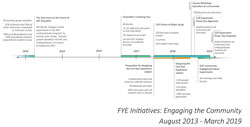
| Vol.
XXXI No.
4 March / April 2019 |
| contents |
| Printable Version |
Progress Towards an Improved
Undergraduate First-Year Experience
The CUP (Committee on the Undergraduate Program) experiment for the Class of 2022, which was designed to investigate ways to promote greater intellectual and personal exploration by students, is giving us crucial quantitative and qualitative data. I detail below some preliminary findings from the experiment.
A Look Back: Building on the Momentum
In the fall of 2017 (see “Designing the First Year at MIT”) my office engaged with faculty, School councils, and other stakeholders about how we could enhance the first-year experience for our undergraduate students. As you can see in the timeline below, we built upon ideas and conversations that dated back to the 2014 Task Force on the Future of MIT Education, (and in some cases, even drew from insights of several decades ago, such as the 1949 Lewis Report).

(click on image to enlarge)
Our recent efforts to enhance the first year were made possible because of the enthusiasm and dedication of the MIT community (see “A Collaboration in Learning”) – in particular our students. The idea that began the CUP Class of 2022 experiment gained traction in the “Designing the First Year at MIT” class. However, the rationale and needs that the students described through their classwork had also been identified separately (and earlier) by faculty, most notably via the parallel work done by the CUP in studying major exploration by first-year students during the 2017-2018 school year.
The CUP Class of 2022 experiment also benefitted from a great deal of additional feedback and positive endorsements in multiple forums, culminating in early letters of support by the Schools of Science, Engineering, HASS, and Management, among many others, and later support from the School of Architecture & Planning. Of course, even those who were eager to experiment also raised important concerns and/or made helpful adjustments to our proposal. All were shared with the CUP. Following this, there was debate within the CUP, building on discussions they had been having for nearly a year and addressing the relative merits of specific policy features that could be implemented to limit anticipated risks. In short, it took a campus to create the experiment.
Monitoring and Measuring Progress, Responding to Concerns
Since the experiment’s approval, we have been carefully monitoring how things are progressing and have made an effort to share our preliminary findings. Initial results suggest that the experiment is enabling students to explore more broadly, while many still continue to take science core GIR subjects early in their time at MIT. You can learn more details and see data online.
We have been working to respond to ongoing and new concerns as well. For example, to augment the experiment, my office has offered support to departments for developing subjects to aid students in exploring majors, minors, and concentrations. Further, we are considering important open questions about the experiment’s current and longer-term impacts, such as the effects of P/NR grading (either in the first semester or thereafter) on performance in those classes and in subsequent classes that rely on that material. There are, of course, risks in experimenting with an MIT undergraduate education. Changes in policies, such as to P/NR, may not serve all students equally well.
Even with all of its strengths, however, our educational model can be continually improved. We agree with the recommendation of the Task Force on the Future of MIT Education about how this can best be achieved: “. . . engage in bold experiments that will help us learn about both the positive and negative aspects of pedagogical and curricular innovations.”
Moving Forward: Class of 2023 Experiment, plus an Advising Pilot
Looking ahead, an experiment for the Class of 2023 has been just approved by CUP (what we are calling Phase Two). Our initial findings from the current experiment indicate a need to encourage more low-unit opportunities for discovery of majors, minors, and concentrations while continuing to enable more traditional student practices of exploring majors through introductory subjects. The Phase Two experiment is designed to balance these two approaches. In drafting the proposal we benefitted from many inputs we gathered from the community over the last six months, and most especially from a thoughtful proposal by the Faculty Officers.
We are also planning an advising pilot for the Class of 2023. Motivated by feedback from students and faculty, and drawing on the work of the CUP in 2005 and 2010-2011, the proposed pilot divides advising functions to a greater extent among a small network, including faculty, staff, and peers, rather than concentrating the many functions in a single faculty member.
Finally, based on ideas from students in the “Designing the First Year Experience” offerings, alongside recommendations from many faculty and instructors, we hope to evaluate some “blue-sky ideas” to spark more curiosity and excitement about learning in the first year. We intend to leverage the flexible and personalized nature of the First-Year Learning Communities (i.e., Concourse, Experimental Study Group, Media Arts and Sciences, and Terrascope) to pilot possible approaches.
Ultimately, the only way to know about the effects – both positive and negative – of new policies and pilots is to try them; and to try them in a way where we make sure we put students first and approach the evaluation with rigor, so that our conclusions can be based on substantive qualitative and quantitative data. That is what we are doing now.
I am very grateful to everyone who is providing input and contributing to our shared goal of creating the best first-year experience on the planet.
| Back to top | |
| Send your comments |
| home this issue archives editorial board contact us faculty website |